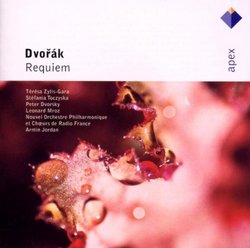| All Artists: Dvorak, Mroz, Paris Nouvel Phil Orch, Jordan Title: Dvorak: Requiem Members Wishing: 0 Total Copies: 0 Label: Wea Apex Classics UK Original Release Date: 1/1/2006 Re-Release Date: 6/1/2006 Album Type: Import Genre: Classical Style: Number of Discs: 2 SwapaCD Credits: 2 UPC: 809274992222 |
Search - Dvorak, Mroz, Paris Nouvel Phil Orch :: Dvorak: Requiem
 | Dvorak, Mroz, Paris Nouvel Phil Orch Dvorak: Requiem Genre: Classical
|
Larger Image |
CD Details |
CD ReviewsRequiem Mikko Louhivuori | Israel | 04/22/2007 (4 out of 5 stars) "Armin Jordan (1936-2006) conducted the Requiem with the accuracy of Swiss clockwork and yet it reaches the transcendental spirituality and overwhelming emotional intensity of this masterpiece of 19th century European music. Jordan was an unusually focused conductor; this shows in his very detailed control of all aspects of the performance. Rapid and extreme changes in volume, rhythm and syncopation are masterfully realized. Powerful locomotive like fortissimos evaporate quite amazingly into pianissimos within a few beats of the score. The soloists, choir and orchestra work together seamlessly. The listener feels that this is authentic Dvorák.
The immense sadness written into the first part of this unique Requiem is genuinely felt in the performance. The music still reflects the awful personal tragedies Antonin and Anna had experienced a decade earlier. When their little daughter Josefa died only two days old in 1875, grieving Dvoák began to work on Stabat Mater. (Josefa's name resembles that of the hopeless love of his life, Josefina). In August 13, 1877, their eleven months old daughter Ruzena accidentally drank phosphor and soon died in great pain. And less than a month later, in September 8, the couple lost their last surviving child, 3 years old son Otakar to smallpox. By now childless Dvorák completed his Stabat Mater in November 13 in the same year. It is unforgettable. Although the Requiem was written over a decade later for the Birmingham festival (1890), it still reflects the pain of parents who lost all their children. The bright second part is a Christian response to the horrors of death that Dvorák knew only too well. The soloists, choir and Nouvel Orchestre Philharmonique perform this masterpiece of spiritual music with deep sincerity and brilliance. There is no feeling of artificiality or acting - the atmosphere is sincere, extremely serious and aerie. Warmly recommended." |

 Track Listings (13) - Disc #1
Track Listings (13) - Disc #1